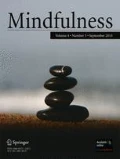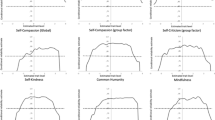Abstract
Objectives
The 26-item Self-Compassion Scale (SCS) and its short 12-item version (SCS-SF) were reported to have acceptable psychometric properties, and both scales are widely used to assess self-compassion in individuals. However, recent investigations were inconsistent regarding factor structure of the SCS, and psychometric properties of the scale were not tested for consistency with principles of fundamental measurement using appropriate methodology such as Rasch analysis.
Methods
A partial credit Rasch model was used to evaluate psychometric properties of the SCS and SCS-SF with the sample of 743 respondents randomly divided into two equal subsamples (A and B) to replicate the results for the purpose of robustness.
Results
Initially, there were no misfitting items but the local dependency between various items affected Rasch model fit. This issue was resolved by combining locally dependent items into four super-items resulting in the best fit to the Rasch model of both SCS and SCS-SF, with evidence of unidimensionality and an excellent sample targeting. Although both scale versions had strong reliability satisfactory for individual and group assessment, the original SCS demonstrated superior psychometric properties reflected by higher reliability indicated by Person Separation Index (PSI) of 0.90 compared to the SCS-SF (PSI = 0.85). These analyses were replicated with the sample B for both scale versions, resulting in equally good fit. This permitted generating ordinal-to-interval conversion tables based on Rasch model estimates.
Conclusions
The current study supported the reliability and internal validity of both the SCS and SCS-SF. Accuracy of these assessment instruments can be further improved by using the ordinal-to-interval conversion tables published here.


Similar content being viewed by others
References
Andrich, D. (1978). A rating formulation for ordered response categories. Psychometrika, 43(4), 561–573.
Andrich, D., Sheridan, B., & Luo, G. (2009). RUMM 2030 (beta version for Windows). Perth, Western Australia: RUMM Laboratory Pty Ltd.
Apodaca, P., & Grad, H. (2005). The dimensionality of student ratings of teaching: Integration of uni- and multidimensional models. Studies in Higher Education, 30(6), 723–748.
Balalla, S. K., Medvedev, O. N., Siegert, R. J., & Krägeloh, C. U. (2019). Validation of the WHOQOL-BREF and shorter versions using Rasch analysis in traumatic brain injury and orthopedic populations. Archives of Physical Medicine and Rehabilitation, 100(10), 1853–1862.
Christensen, K. B., Makransky, G., & Horton, M. (2017). Critical values for Yen’s Q. 3: Identification of local dependence in the Rasch model using residual correlations. Applied Psychological Measurement, 41(3), 178–194.
Costa, J., Marôco, J., Pinto-Gouveia, J., Ferreira, C., & Castilho, P. (2016). Validation of the psychometric properties of the Self-Compassion Scale. Testing the factorial validity and factorial invariance of the measure among borderline personality disorder, anxiety disorder, eating disorder and general populations. Clinical Psychology & Psychotherapy, 23(5), 460–468.
Cox, B. J., Parker, J. D. A., & Swinson, R. P. (1996). Anxiety sensitivity: Confirmatory evidence for a multidimensional construct. Behaviour Research and Therapy, 34(7), 591–598.
Durkin, M., Beaumont, E., Martin, C. J. H., & Carson, J. (2016). A pilot study exploring the relationship between self-compassion, self-judgement, self-kindness, compassion, professional quality of life and wellbeing among UK community nurses. Nurse Education Today, 46, 109–114.
Fisher, W. P. (1992). Reliability statistics. Rasch Measurement Transactions, 6(3), 238.
Gilbert, P., McEwan, K., Matos, M., & Rivis, A. (2011). Fears of compassion: Development of three self-report measures. Psychology and Psychotherapy: Theory, Research and Practice, 84(3), 239–255.
Hagell, P., & Westergren, A. (2016). Sample size and statistical conclusions from tests of fit to the Rasch model according to the Rasch Unidimensional Measurement Model (RUMM) Program in health outcome measurement. Journal of Applied Measurement, 17(4), 416–431.
Heym, N., Heasman, B. C., Hunter, K., Blanco, S. R., Wang, G. Y., Siegert, R., Cleare, A., Gibson, G. R., Kumari, V., & Sumich, A. L. (2019). The role of microbiota and inflammation in self-judgement and empathy: Implications for understanding the brain-gut-microbiome axis in depression. Psychopharmacology, 236(5), 1459–1470.
Hobart, J., & Cano, S. (2009). Improving the evaluation of therapeutic interventions in multiple sclerosis: The role of new psychometric methods. Health Technology Assessment, 13(12), iii, ix–x, 1–177. https://doi.org/10.3310/hta13120.
Kumlander, S., Lahtinen, O., Turunen, T., & Salmivalli, C. (2018). Two is more valid than one, but is six even better? The factor structure of the Self-Compassion Scale (SCS). PLoS One, 13(12), e0207706.
Lau, M. A., Bishop, S. R., Segal, Z. V., Buis, T., Anderson, N. D., Carlson, L., Shapiro, S., Carmody, J., Abbey, S., & Devins, G. (2006). The Toronto Mindfulness Scale: Development and validation. Journal of Clinical Psychology, 62(12), 1445–1467.
Leung, Y.-Y., Png, M.-E., Conaghan, P., & Tennant, A. (2013). A systematic literature review on the application of Rasch analysis in musculoskeletal disease—A special interest group report of OMERACT 11. The Journal of Rheumatology, 41(1), 159–164.
López, A., Sanderman, R., Smink, A., Zhang, Y., van Sonderen, E., Ranchor, A., & Schroevers, M. J. (2015). A reconsideration of the Self-Compassion Scale’s total score: Self-compassion versus self-criticism. PLoS One, 10(7), e0132940.
Lundgren-Nilsson, Å., & Tennant, A. (2011). Past and present issues in Rasch analysis: The Functional Independence Measure (FIM) revisited. Journal of Rehabilitation Medicine, 43(10), 884–892.
Lundgren-Nilsson, Å., Jonsdottir, I. H., Ahlborg, G., & Tennant, A. (2013). Construct validity of the psychological general well being index (PGWBI) in a sample of patients undergoing treatment for stress-related exhaustion: a Rasch analysis. Health and Quality of Life Outcomes, 11(1), 2.
Marais, I., & Andrich, D. (2008). Effects of varying magnitude and patterns of response dependence in the unidimensional Rasch model. Journal of Applied Measurement, 9(2), 105–124.
Masters, G. N. (1982). A Rasch model for partial credit scoring. Psychometrika, 47(2), 149–174.
Medvedev, O. N., Siegert, R. J., Kersten, P., & Krägeloh, C. U. (2017a). Improving the precision of the Five Facet Mindfulness Questionnaire using a Rasch approach. Mindfulness, 8(4), 995–1008.
Medvedev, O. N., Siegert, R. J., Mohamed, A. D., Shepherd, D., Landhuis, E., & Krägeloh, C. U. (2017b). The Oxford Happiness Questionnaire: Transformation from an ordinal to an interval measure using Rasch analysis. Journal of Happiness Studies, 18(5), 1425–1443.
Medvedev, O. N., Turner-Stokes, L., Ashford, S., & Siegert, R. J. (2018). Rasch analysis of the UK Functional Assessment Measure in patients with complex disability after stroke. Journal of Rehabilitation Medicine, 50(5), 420–428.
Mitchell-Parker, K., Medvedev, O. N., Krägeloh, C. U., & Siegert, R. J. (2018). Rasch analysis of the Frost Multidimensional Perfectionism Scale. Australian Journal of Psychology, 70(3), 258–268.
Neff, K. D. (2003a). Development and validation of a scale to measure self-compassion. Self and Identity, 2(3), 223–250.
Neff, K. (2003b). Self-compassion: An alternative conceptualization of a healthy attitude toward oneself. Self and Identity, 2(2), 85–101.
Neff, K. D. (2016). The Self-Compassion Scale is a valid and theoretically coherent measure of self-compassion. Mindfulness, 7(1), 264–274.
Neff, K. D., & Dahm, K. A. (2015). Self-compassion: What it is, what it does, and how it relates to mindfulness. In B. Ostafin, M. Robinson, & B. Meier (Eds.), Handbook of mindfulness and self-regulation (pp. 121–137). Berlin: Springer. https://doi.org/10.1007/978-1-4939-2263-5_10.
Neff, K. D., Tóth-Király, I., Yarnell, L. M., Arimitsu, K., Castilho, P., Ghorbani, N., Guo, H. X., Hirsch, J. K., Hupfeld, J., Hutz, C. S., & Kotsou, I. (2019). Examining the factor structure of the Self-Compassion Scale in 20 diverse samples: Support for use of a total score and six subscale scores. Psychological Assessment, 31(1), 27.
Nijsten, T., Unaeze, J., & Stern, R. S. (2006). Refinement and reduction of the Impact of Psoriasis Questionnaire: Classical test theory vs. Rasch analysis. British Journal of Dermatology, 154(4), 692–700.
Norquist, J. M., Fitzpatrick, R., Dawson, J., & Jenkinson, C. (2004). Comparing alternative Rasch-based methods vs raw scores in measuring change in health. Medical Care, 42(1 Suppl), I25–I36.
Pratscher, S. D., Wood, P. K., King, L. A., & Bettencourt, B. A. (2019). Interpersonal mindfulness: Scale development and initial construct validation. Mindfulness, 10(6), 1044–1061.
Raes, F., Pommier, E., Neff, K. D., & Van Gucht, D. (2011). Construction and factorial validation of a short form of the self-compassion scale. Clinical Psychology & Psychotherapy, 18(3), 250–255.
Rasch, G. (1960). Probabilistic models for some intelligence and attainment tests. Denmark, Copenhagen: Danish Institute for Educational Research.
Segal, Z. V., Williams, J. M. G., & Teasdale, J. D. (2013). Mindfulness-based cognitive therapy for depression (2nd ed.). New York: The Guilford Press.
Shonin, E., Van Gordon, W., Compare, A., Zangeneh, M., & Griffiths, M. D. (2014). Buddhist-derived loving-kindness and compassion meditation for the treatment of psychopathology: A systematic review. Mindfulness, 6(5), 1161–1180.
Shrestha, A. K. (2016). Positive psychology: Evolution, philosophical foundations, and present growth. Indian Journal of Positive Psychology, 7(4), 460.
Sinclair, S., Kondejewski, J., Raffin-Bouchal, S., King-Shier, K. M., & Singh, P. (2017). Can self-compassion promote healthcare provider well-being and compassionate care to others? Results of a systematic review. Applied Psychology: Health and Well-Being, 9(2), 168–206.
Smith Jr., E. V. (2002). Detecting and evaluating the impact of multidimensionality using item fit statistics and principal component analysis of residuals. Journal of Applied Measurement, 3(2), 205-231.
Tennant, A., & Conaghan, P. G. (2007). The Rasch measurement model in rheumatology: What is it and why use it? When should it be applied, and what should one look for in a Rasch paper? Arthritis Care & Research, 57(8), 1358–1362.
Tennant, A., & Pallant, J. F. (2006). Unidimensionality matters! (A tale of two Smiths?). Rasch Measurement Transactions, 20(1), 1048–1051.
Thurstone, L. L. (1931). The measurement of social attitudes. The Journal of Abnormal and Social Psychology, 26(3), 249.
Wilson, M. (2004). Constructing measures: An item response modeling approach (1st ed.). London: Routledge.
Wright, B. D., & Stone, M. H. (1979). Best test design. San Diego: Mesa Press.
Acknowledgements
Data collection on this project was part of a larger data collection, internally funded by Nottingham Trent University, Health and Wellbeing Grant. We would like to thank Bryony Heasman for her help in collecting data and all participants for their time in taking part in the study. We would like to acknowledge and thank the University of Waikato Māori & Psychology Research Unit for granting a scholarship to the first author to complete this study.
Funding
Part funding for the project was provided internally through Nottingham Trent University.
Author information
Authors and Affiliations
Contributions
Initial draft of the manuscript was written by KPF and ONM, with edits from AS and NH. Data collection was conducted by AS and NH. All authors were involved in the study conceptualisation. Data cleaning, scoring and analyses were performed by KPF and ONM. All authors edited further revisions of the manuscript and approved the final version of the manuscript for submission.
Corresponding author
Ethics declarations
Conflict of Interest
The authors declare that they have no conflict of interest.
Informed Consent
All participants involved in this study provided their informed consent.
Ethics Statement
All study procedures were approved by the ethics committee for the School of Social Sciences, Nottingham Trent University, UK.
Additional information
Publisher’s Note
Springer Nature remains neutral with regard to jurisdictional claims in published maps and institutional affiliations.
Rights and permissions
About this article
Cite this article
Finaulahi, K.P., Sumich, A., Heym, N. et al. Investigating Psychometric Properties of the Self-Compassion Scale Using Rasch Methodology. Mindfulness 12, 730–740 (2021). https://doi.org/10.1007/s12671-020-01539-8
Accepted:
Published:
Issue Date:
DOI: https://doi.org/10.1007/s12671-020-01539-8



